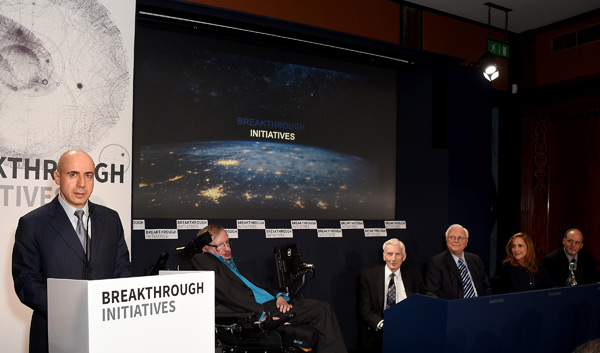Breakthrough Listen, a scientific research program led by popular British physicist Stephen Hawking, detects signs of alien life.
The Breakthrough Listen project set up by Professor Stephen Hawking in association with Russian billionaire Yuri Milner has picked up some mysterious signals that could well have come from another galaxy, hinting at the presence of alien life. Researchers associated with the project picked up 15 new fast radio bursts or FRBs, lasting just a few milliseconds, from an unidentified source.
This source, labeled ‘FRB 121102’, was first discovered in 2012. The team associated with the project admits that they have no idea where these signals were coming from, triggering speculations regarding the presence of an alien civilization in a far away galaxy. When these signals were first picked up, scientists believed that these were being triggered by a supernova. However, this theory was debunked when the signals repeated mysteriously in 2015 and 2016.
The experts at the Breakthrough Listen project uncovered 15 fresh bursts this year by scanning the same galaxy from where signals were received in the past at a higher frequency. Speaking of the development, Dr. Vishal Gajjar from UC Berkeley Research Centre told The Daily Express, “We really have no idea about where they come from. We currently know 30 to exist in the universe and only one is known to repeat which means we can look at it again and again. We looked at this one at a higher frequency. If some form of life would like to produce a signal that is detectable to another civilization this could be a way to do it, but I don’t think they are coming from intelligent civilizations.”

Andrew Siemion, director, Berkeley SETI Research Center and Breakthrough Listen, was also quoted as saying, “There are more theories than the number of sources. We have opened more questions than answers. As we do more study we find more weird things. Whether or not fast radio bursts turn out to be signatures of extraterrestrial technology, Breakthrough Listen is helping to push the frontiers of a new and rapidly growing area of our understanding of the universe around us.”
It is interesting to note that Stephen Hawking himself isn’t a big fan of the idea of any contact between humans and aliens, even if such extraterrestrial life exists. Earlier this year, Hawking had issued a categorical warning stating that aliens could very well kill humans, in case we ever try to establish contact with them. Speaking about the potential of planet Gliese 832c – a hot super-Earth discovered recently – to support alien life, he said it was highly unlikely that any form of life out there would like to hear from us.
In the documentary ‘Stephen Hawking’s Favourite Places’, he says, “One day, we might receive a signal from a planet like this, but we should be wary of answering back. Meeting an advanced civilization could be like Native Americans encountering Columbus. That didn’t turn out so well.” He went on to add that any form of intelligent extraterrestrial life could well be “rapacious marauders roaming the cosmos in search of resources to plunder, and planets to conquer and colonize”.
Irrespective of Hawking’s strongly articulated reservations, the human race has been forever fascinated with the idea of interacting with life from the outer space. Will these FBRs hold the key to transforming the biggest sci-fi dream of the human race into a reality? That remains to be seen.




